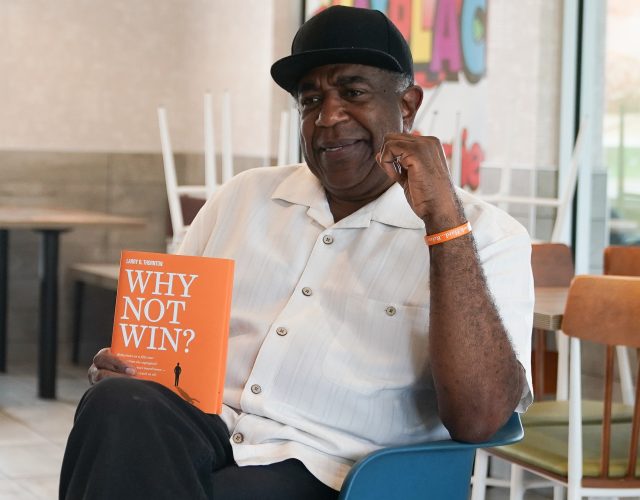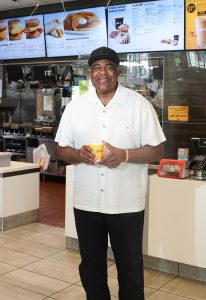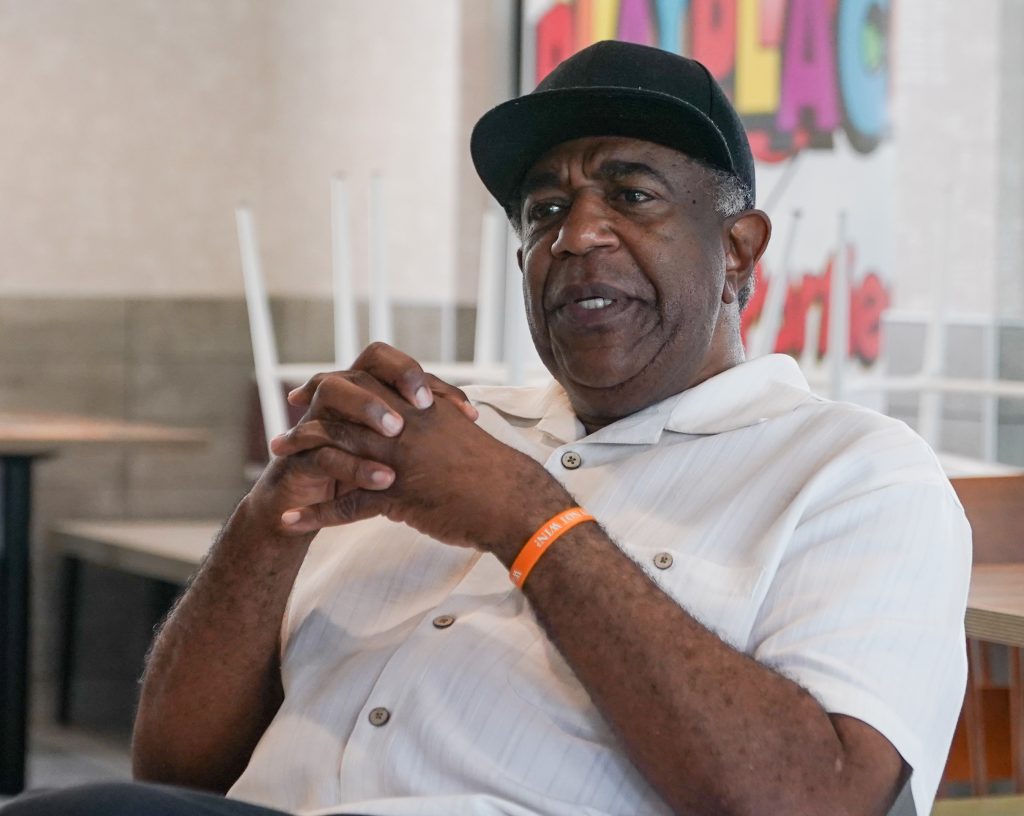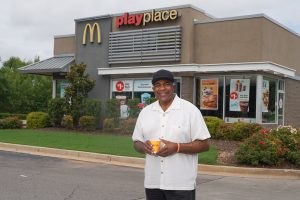
By Haley Wilson
The Birmingham Times
As a man of many talents—artist, leader, author, entrepreneur—Larry Thornton Sr. made history when he became the first African American to open a McDonald’s in Birmingham 30 years ago. While that would be the beginning of a stellar business career, none of it was easy for the owner of seven profitable McDonald’s franchises in the Birmingham metro area.
Throughout his school-age years, Thornton was told he would never make it to college or even beyond, and he admits that he didn’t do very well in school.
“The powerful, very pointed poignant messages of inferiority on a daily basis were more than I could handle,” he said of his early education years. “So, I shut down, went to summer school in 1971, … and went on to Robert E. Lee [High School in Montgomery, Alabama, near where I grew up]. The next year, I went to summer school. That same year, I failed summer school,” he said.
Thornton is now president of Thornton Enterprises LLC, an entity that specializes in the ownership of McDonald’s locations and serves in numerous leadership positions, including on the board of directors for First Commercial Bank and the Alabama Institute for Deaf and Blind.
He was the first African American to be elected president of The Club in Birmingham, a premier, members-only supper club. In addition, he is current president of the Kiwanis Club of Birmingham and was named CEO of the Year by the Birmingham Business Journal in 2019.
With all of his accomplishments, Thornton doesn’t mind being transparent when revealing his struggles because he finds satisfaction in sharing his story.
“The real Larry Thornton is this struggling kid who had these academic missteps, but the message is that we should not allow our past failures and missteps to follow us and to define us,” he said. “I think every parent wishes that his or her kid or grandkid could understand that it doesn’t matter where you’ve been [or] where you are. All that really matters in life is where you’re going and that you’ve made up your mind to get there.”
The Franchise

Thornton, 65, has always been one to make up his mind. In 1990, he attended the McDonald’s Restaurants Hamburger University in Oakbrook, Illinois, to prepare for the opening of his franchise at Heritage Town Center in Southwest Birmingham in 1992.
That same year, he incorporated Thornton Enterprises, through which he has opened additional locations, including one in the Hueytown area and one near Brighton. As of 2020, recent expansions can be found in the Midfield, Claremont, and Roebuck neighborhoods.
His son, Larry D. Thornton Jr., also called “Dale,” became one of the youngest 100 percent approved McDonald’s owner/operators at 25, when he purchased his first McDonald’s restaurant.
“So, my son, [now 40], was 10 years old when I built the first store,” Thornton said. “I made him the ‘playground manager’ at the time. His job was keeping the balls in the ball pit, … but what he was doing was relating, building his interest in the business. I have three kids, two daughters and one son, all of whom all have learned the business.
“I think the business pretty much demonstrated to my girls exactly what they didn’t want to do, and it demonstrated to my son exactly what he did want to do. … [My son] has always been with the business. He went to Miles College, graduated, and went right into the honors program.”
“These two stories, [about my son and I owning franchises], are great American stories,” Thornton added. “Much more significantly, they’re great African American stories. … How many of us can look and say at 25 years old, ‘I don’t manage a store, I don’t supervise a store, but I own a $2.2 million facility.”
The Spark

The senior Thornton, born on Oct. 5, 1955, was raised in Madison Park, a small Alabama town between Montgomery and Wetumpka. He was able to attend Goodwyn Middle School as part of its first integrated class of 1967 through the Freedom of Choice legislation, one of several measures designed to integrate U.S. schools between 1965 and 1970.
“We had this very forward-thinking attorney who lived in Madison Park. His name was Solomon C., and he went about canvassing the community,” he recalled. “It was not a mandate that we go to this white school, but we had ‘Freedom of Choice,’ which for the first time gave African American students an opportunity to attend otherwise all-white schools. … Thanks to his canvassing, his daughter and five others of us were recruited for this experience.”
While in high school, Thornton found a passion for art and received mentorship from his English teacher, Ms. Nichols, who also encouraged him to apply for college.
“I wasn’t very smart, so I ended up with Ms. Nichols for session room and senior English,” he recalled. “Ms. Nichols assigned a book to me to read. It was called ‘The Pilgrims Progress’ by John Bunyan. … [After completing a book report], Ms. Nichols places a B-plus on my desk. I’m shocked, she’s shocked, but it was enough for her to think, … ‘There’s something else to this kid, and I’m going to make a difference.’ She was demonstrating that I was somebody that could measure up, somebody that could make a difference.”
With her encouragement, Thornton enrolled at Alexander City State Junior College as an art major and later earned a Bachelor of Science degree in commercial art from Alabama State University.
“There was a different step in my walk because Ms. Nichols indicated that I was college material,” he said. “It’s amazing what can happen, and [it] should be a message to all of us [about] the power and the impact we can have on other people.”
Thornton taught art at Vestavia Hills High School for four years in the 1970s and was let go due to staffing cutbacks. He then lived as a freelance artist and sign painter until, with a reference from the father of a former student, he landed a $5-an-hour job in advertising for Coca-Cola Bottling Co. United in 1979.
“I get to Coca-Cola … [and] nobody there can paint a sign as well as I can. I’m thinking, ‘I can’t learn anything here.’ Within two to three months, I’m promoted to advertising manager, and I’m thinking, ‘I’m not getting used to this because they’re gonna fire me. I’m not gonna go through that again,’” he said.
Within the first few months of working with Coca-Cola, Thornton was promoted to advertising manager, a position he held until 2003. Overall, Thornton has been with Coca-Cola for the past 42 years and now holds a seat with the company’s board of directors.
“Why Not Win?”

Aside from his leadership positions and his business ventures, Thornton and his mentee Dr. Zillah Fluker founded the nonprofit “Why Not Win?” Institute in November 2018. The Birmingham-based organization uses lessons from Thornton’s story and develops “programming to transform lives through personal and professional development with an emphasis on personal accountability,” according to Fluker.
“Basically, [the ‘Why Not Win?’ Institute] creates access to positioning people to be employable,” she added. “A quote I often say is, ‘You can’t guarantee employment, … but you can guarantee employability.’”
The institute came about after Fluker wrote the introduction to the manuscript of Thornton’s book, “Why Not Win?” published in 2019.
“After I read the book, I went, ‘Oh, this is more than a book, … we could build a curriculum around it,” she said.
Through the messaging of his book and the institute, Thornton has had the opportunity to deliver college commencements and host workshops with a focus on “leadership development” at 30-plus institutions, including the University of Alabama at Birmingham (UAB) Honors College, Auburn University, Alabama Agricultural and Mechanical University, and Alabama State University in Alabama; Clemson University in South Carolina; and Fisk University in Tennessee.
The messaging of the “Why Not Win?” Institute has also been presented as sessions to corporations, such as Alabama Power Company, and as a six-part series with Coca-Cola Bottling Company United.
“[The ‘Why Not Win?’ Institute] has been the most phenomenal thing,” Thornton said. “Another one of my favorite topics in the institute is, ‘The way you are is not the way you have to be.’ You hear it, I hear it, everybody hears it—[People think], ‘That’s just the way I am. I’ve been that way all my life.’ People never stop to think, ‘Is it working for [me]?’ If it’s working for you, then continue to do it. If it’s not working for you, it’s not like you’re chained into being this way, you can give yourself permission to abort that way of being and be afforded a different way.”
Thornton’s “way” as outlined in his book reflects useful lessons,” he said: “[Lessons] l have learned on my journey and the anecdotes associated with them.”
“It’s about personal accountability and responsibility,” said Thornton. “It’s about being the best version of yourself.”
To learn more about Larry D. Thornton Sr., visit www.larrythornton.com or www.whynotwin.org.



